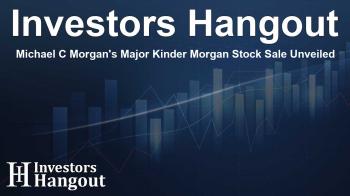Michael C Morgan's Major Kinder Morgan Stock Sale Unveiled

Michael C Morgan Sells $4.30 Million in Kinder Morgan Stock
Michael C Morgan, who serves as a Director at Kinder Morgan (KMI), made headlines recently with a significant insider sale of stock totaling $4.30 million. This transaction, executed on February 20, has been officially recorded in a recent SEC filing.
Transaction Highlights: Morgan sold a substantial amount of 160,000 shares of Kinder Morgan. The sale was documented in a Form 4 filing with the U.S. Securities and Exchange Commission. Following the sale, the share price for Kinder Morgan saw a slight decrease of 0.41%, bringing its trading value to $26.48.
Understanding Kinder Morgan's Business Operations
Kinder Morgan stands as a prominent entity in the midstream energy sector across North America, managing around 80,000 miles of pipelines dedicated to gas, refined products, and carbon dioxide. Beyond pipelines, it also has a considerable presence in the storage and terminal sector, maintaining one of the industry's largest portfolios. A significant portion of Kinder Morgan's revenue is generated through fee-based contracts focused on the handling and transporting of fossil fuel products.
Assessing Kinder Morgan's Financial Performance
Revenue Trends: The company's revenue trajectory over the past three months has presented challenges, showing a downturn of approximately -1.26% as of December 31, 2024. When measured against its peers in the energy sector, Kinder Morgan's growth rate appears below the industry average, raising some concerns among investors.
Profitability Insights:
-
Gross Margin: Kinder Morgan has maintained a robust gross margin of 53.98%, reflecting its adept cost management capabilities and contributing to its competitive edge.
-
Earnings per Share (EPS): Currently, Kinder Morgan's EPS is reported at 0.3, which is below the average for its industry, signaling potential challenges in profitability.
Debt Management Overview: The company manages its financial leverage effectively, presenting a debt-to-equity ratio of 1.04, which is lower than the industry average. This healthy balance between debt and equity is often viewed favorably by potential investors.
Valuation Metrics Insight:
-
Price to Earnings (P/E) Ratio: With a P/E ratio of 22.73, Kinder Morgan's stock may be considered undervalued compared to industry benchmarks.
-
Price to Sales (P/S) Ratio: Their current P/S ratio of 3.91 indicates a perceived overvaluation based on sales performance.
-
EV/EBITDA Analysis: The company’s EV/EBITDA ratio of 13.46 suggests that it is regarded as more valuable than many of its competitors.
Market Capitalization: Notably, Kinder Morgan's market capitalization surpasses many in the industry, emphasizing its significant presence and stability within the market context.
Understanding the Importance of Insider Trades
Insider trading activities often provide insightful perspectives for investors, but they should be interpreted cautiously, alongside various investment factors.
According to legal definitions, an "insider" may refer to any officer, director, or beneficial owner holding more than ten percent of a company's equity securities, as governed by Section 12 of the Securities Exchange Act of 1934. This includes high-level executives and significant shareholders, all of whom must disclose their trading activity via Form 4 filings within a specified timeframe.
A purchase by an insider often signals confidence in the stock's potential increase, whereas sells, like Morgan's, might stem from various personal or financial reasons unrelated to the company's performance.
Navigating Insider Transaction Codes
Investors typically emphasize transactions listed in the open market, represented in Table I of the Form 4 filing. A P in Box 3 indicates a purchase, while S represents a sale. Other codes, such as C for conversions and A for grants or awards, provide additional context about the nature of these transactions.
Frequently Asked Questions
What prompted Michael C Morgan to sell his Kinder Morgan shares?
Insider sales can occur due to various personal financial strategies, and in this case, it’s essential to investigate further before drawing conclusions about the company's outlook.
How does Kinder Morgan compare to other companies in the energy sector?
Kinder Morgan's performance has recently been challenged, showing revenue decline compared to many of its industry peers.
What does the current EPS of Kinder Morgan indicate?
With an EPS of 0.3, Kinder Morgan's current earnings suggest it may face challenges in maintaining profitability relative to competitors.
What is the significance of a high gross margin?
A high gross margin, like Kinder Morgan's 53.98%, indicates strong cost management and profitability, positioning the company favorably against its peers.
How should investors interpret insider transactions?
While insider sales can raise some flags, they should not trigger immediate panic among investors as there can be numerous legitimate reasons for such activities.
About The Author
Contact Dominic Sanders privately here. Or send an email with ATTN: Dominic Sanders as the subject to contact@investorshangout.com.
About Investors Hangout
Investors Hangout is a leading online stock forum for financial discussion and learning, offering a wide range of free tools and resources. It draws in traders of all levels, who exchange market knowledge, investigate trading tactics, and keep an eye on industry developments in real time. Featuring financial articles, stock message boards, quotes, charts, company profiles, and live news updates. Through cooperative learning and a wealth of informational resources, it helps users from novices creating their first portfolios to experts honing their techniques. Join Investors Hangout today: https://investorshangout.com/
The content of this article is based on factual, publicly available information and does not represent legal, financial, or investment advice. Investors Hangout does not offer financial advice, and the author is not a licensed financial advisor. Consult a qualified advisor before making any financial or investment decisions based on this article. This article should not be considered advice to purchase, sell, or hold any securities or other investments. If any of the material provided here is inaccurate, please contact us for corrections.

